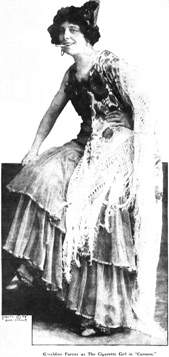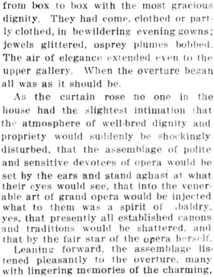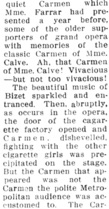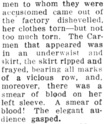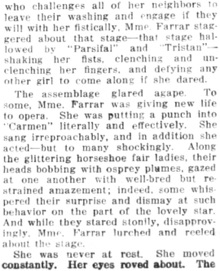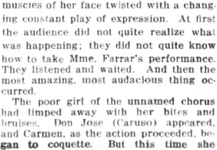Charlie Chaplin´s Burlesque on Carmen next previous
Burlesque on Carmen Clippings 30/101
San Francisco Examiner, San Francisco, California, March 19, 1916.
Geraldine Farrar as The Cigarette Girl in „Carmen.“
(...) Photo by Aime Dupont,
San Francisco Examiner, March 19, 1916
& Scene from Carmen on the
Metropolitan Opera House Stage – Caruso Standing Over
the Prostrate Form of Carmen (Miss Farrar)
(...) San Francisco Examiner, March 19, 1916
„She had Charley-Chaplinized the most sacred of the arts“
Editorial content. „Charlie Chaplin‘s Influence
on the Grand Opera
How Geraldine Farrar, Impressed by the Instructions
of Her Motion Picture Director, Introduced
,Rough-House‘ Methods Into Her New Interpretation
of ,Carmen‘ to the Dismay of Caruso, Who
Pushed Her Off Her Feet – and Got His Face Slapped!
Charlie Chaplin Who Was Pointed Out
to Geraldine Farrar as an Excellent Model for Live-Wire
Actions When the Motion Picture Stage Director
Complained That Her Old-Fashioned, Conventional Grand-Opera Acting Would Never Do In Moving Pictures.
WHEN Geraldine signed her contract to do a photo-play
of Carmen, her most famous grand-opera success,
the managers of the motion picture company had misgivings.
Could an opera, which depends upon the voices
of the singers and a magnificent orchestra, be a success
in motion pictures? „Leave that to me,“ said the
stage director.“
Lasky‘s Carmen starring Geraldine Farrar was
directed by Cecil B. DeMille.
„When Geraldine Farrar some months ago made her
appearance at the motion picture studio dressed
for the part of Carmen she began to go through the part
exactly as she has always done on the Metropolitan
Opera stage in New York.
,We‘ll stop right here,‘ said the stage director. ,I‘m afraid
that won‘t do.‘
,No?‘ Miss Farrar queried.
,On the opera stage you are the greatest ever,‘ said the
stage manager, ,but in motion pictures we‘ve got
to do some real acting.‘
,Yes? But this is the way I have always done Carmen.‘
Mme. Farrar returned, with perfect good nature.
,Nobody does any real acting in an opera. When you sing
Carmen people go to hear the music. In the movies
people want to see some acting. Did you ever see Charlie
Chaplin?‘
,Why, certainly – he is superb.‘
,Something Doing All the Time.‘
,Well, just forget Caruso and his big voice and imagine
Charlie Chaplin playing opposite you in Carmen.‘ You
know what he would be doing all the time, and you can figure out
what you would have to be doing to keep your end up.‘
,Oh, I see what you mean.‘
,Kicking, punching, biting, scratching – something doing
all the time. Of course I don‘t mean to say that every
reel has got to be a rough-house. But you can‘t sing a part
in motion pictures, and those foolish grand opera
motions are not acting.‘
,That is very interesting,‘ Mme. Farrar smiled.
,Who was Carmen? She was a girl who
worked in a cigarette factory. When factory girls have a row
it is no Fifth avenue drawing room afternoon tea.
When factory girls fight they put up a real fight – pull hair, use
their fists, tear their clothes, roll over on the ground,
bite and kick – you are playing the part of a cigarette girl
in this piece.‘
,I see,‘ said Mme. Farrar thoughtfully. ,No doubt your
interpretation is right. Let us start all over again.‘
–
The largest audience of the season filled the Metropolitan
Opera House, New York, the other night – that august
temple of grand opera – to hear Mme. Geraldine Farrar and
Signor Enrico Caruso at the first performance given
this season of Bizet‘s Carmen. An air of well-bred expectancy
prevailed throughout the house. In the horseshoe
of boxes refined and lovely ladies, leaders of New York‘s
ultra fashionable set, chatted softly and amiably and
bowed to one another from box to box with the most gracious
dignity. They had come, clothed or partly clothed,
in bewildering evening gowns; jewels glittered, osprey plumes
bobbed. The air of elegance extended even to the
upper gallery. When the overture began all was as it should be.
As the curtain rose no one in the house had the
slightest intimation that the atmosphere of well-bred dignity
and propriety would suddenly be shockingly disturbed,
that the assemblage of polite and sensitive devotees of opera
would be set by the ears and stand aghast at what
their eyes would see, that into the venerable art of grand opera
would be injected what to them was a spirit of ribaldry,
yes, that presently all established canons and traditions would be shattered, and that by the fair star of the opera herself.
Leaning forward, the assemblage listened pleasantly to the
overture, many with lingering memories of the charming
quiet Carmen which Mme. Farrar had presented a year before,
some of the older supporters of grand opera with
memories of the classic Carmen of Mme. Calve. Ah, that
Carmen of Mme. Calve! Vivacious – but not too
vivacious!
The beautiful music of Bizet sparkled and entranced.
Then, abruptly, as occurs in the opera, the door
of the cigarette factory opened and Carmen, disheveled,
fighting with the other cigarette girls was precipitated
on the stage. But the Carmen that appeared was not the Carmen
the polite Metropolitan audience was accustomed to.
The Carmen to whom they were accustomed came out of the
factory disheveled, her clothes torn – but not too much
torn. The Carmen that appeared was in an underwaist and skirt,
the skirt ripped and frayed, bearing all marks of a vicious
row, and, moreover, there was a smear of blood on her left sleeve.
A smear of blood! The elegant audience gasped.
More, the moment Mme. Farrar appeared Carmen had
changed. Her eyes blazed, her face contorted, every
muscle of her was alive. Before you could say ,Jack Robinson,‘
she had floored one of the cigarette girls, and then,
before their eyes, that assemblage of 3,000 saw America‘s
fairest prima donna, one of the stars of the venerable
Metropolitan, roll over her fallen antagonist, grapple with her,
pummel her with her fists, pound her and actually bite
her. But what was their amazement when, rising, she gave the
girl a vicious kick. Then, like an inebriate woman
of the gutter, who challenges all of her neighbors to leave
their washing and engage if they will with her fistically.
Mme. Farrar staggered about the stage – that stage hallowed
to Parsifal and Tristan – shaking her fists, clenching
and unclenching her fingers, and defying any other girl to come
along if he shared.
The assemblage glared agape. To some, Mme. Farrar
was giving new life to opera. She was putting a punch
into Carmen literally and effectively. She sang irreproachably,
and in addition she acted – but to many shockingly.
Along the glittering horseshoe fair ladies, their heads bobbing
with osprey plumes, gazed at one another with well-bred
but restrained amazement; indeed, some whispered their surprise
and dismay at such behavior on the part of the lovely star.
And while they stared stonily, disapprovingly, Mme. Farrar lurched
and reeled about the stage.
She was never at rest. She moved constantly. Her eyes
roved about. The muscles of her face twisted with
a changing constant play of expression. At first the audience
did not quite realize what was happening; they did not
quite know how to take Mme. Farrar‘s performance. They listened
and waited. And then the most amazing, most audacious
thing occurred.
The poor girl of the unnamed chorus had limped away with
her bites and bruises. Don Jose (Caruso) appeared,
and Carmen, as the action proceeded, began to coquette.
But this time she coquetted as no Carmen of the
opera had ever coquetted. Indeed, to many of the elegant ladies
in the boxes there was something unseemly in her
abandonment. They were not, it is true, quite pleased.
Presently the time came for Carmen to fling
her rose into the face of Don Jose. The audience expected
to see Mme. Farrar fling the rose as Calve had done
it, as she had done it a year before. Caruso expected to have that
rose flung in his face – but lightly, gently, conventionally.
What a surprise of that audience, what was the aghast horror
and indignation of the great golden-throated one
himself, the incomparable Caruso, when, instead of lightly tossing
the rose, the fair Farrar‘s hand smote his face
a resounding whack!
,Oh!‘ An audible gasp arose from the house. The great
golden-throated one, the incomparable Caruso,
his eyes blazing their rage, staggered away, ruefully rubbing
his cheek. His face was red from the fair prima
donna‘s terrific right-hander. he was so started, so dum-founded,
so indignant that he could hardly sing.
Every one in the house had seen it. All society – including
the Goelets, Harrimans, Ogden Millses, Havemeyers,
Iselins, Gallatins, etc. – were surprised and shocked. Such
realism had never before been seen on the grad
opera stage.
For a violation of the traditions of grand opera, to the patrons
and supporters of grand opera, is like the violation
of a commandment. The tradition goes that opera must be sung
– not acted, and that it must be performed with dignity.
From prima donna to chorus singer and ballet performer it must
be done along certain lines, in such a particular way,
without a departure into new business. ,Tra-la-la,‘ sings the
prima donna, lifting her right arm, woodenly and
putting one foot forward stodgily. ,Tra-la-la,‘ sings the chorus
lady, lifting the left arm, and extending the right foot.
,Lalala! Lalala!‘ sing the chorus, moving forward and backward
with measured step.
Actually Slapped Caruso‘s Face.
Only as Mme. Farrar‘s performance progressed did the import
of what they beheld dawn upon the assemblage. For
what had first shocked them was only the beginning of surprises.
When she laughed, Mme Farrar laughed as Carmen
had never laughed. It was the vulgar laughter of a factory girl.
She made Carmen realistic.
Caruso sang, and while he sang Mme. Farrar moved about.
If she was not walking, her eyes were moving, or her arms
were in action. She swayed her hips, smiled, scowled, tossed
her head. There came the scene in Lillas Pastia‘s inn.
What was the astonishment of the audience when Mme. Farrar
threw herself full length upon a table. What was their
further amazement when, again, she sat cross-legged – like
any common girl of a city‘s slums. Meanwhile, it was
visible to all that the great Caruso was becoming more and more
irritated, more and more angry.
While he was singing a beautiful and difficult aria – when,
of course, according to all traditions, every eye should
be fastened upon him, every ear listening – Mme. Farrar attracted
attention to herself by moving about. She took the spotlight
from the tenor. As Caruso sang his eyes sometimes fell on the
fair agile Carmen, but with a glare not in keeping with
even a stage lover. Now and then, it is said, his golden voice
trembled. Mme. Farrar was never in repose. Those
who sympathized with Caruso, smarting under the blow, admired
the great one‘s restraint.
After the first act it could be observed that part of the
audience clapped and cheered, while others were
ominously silent. Mme. Farrar had committed the unutterable
thing – she had acted in grand opera! Worse, she
had Charley-Chaplinized the most sacred of the arts. She had
shattered the inviolable traditions of dignity with
the common business of the movies! She had engaged
in a dust-biting Charley Chaplin fracas. She had
brought back with her from her career as a movie actress
that business of constant movement necessary
for the reel. She had slapped Caruso‘s face, just as Charley
Chaplin engages in face-slapping stunts. She had
realized by acting a living Carmen! Instead of the set movements
and elegant repose necessary even in such a part,
she was eternally in action. She moved about even during
a prayer.
The climax, however, was reached only in the third act,
when, while Don Jose sings impassioned emotional
music, Carmen is supposed to cling to him. But Mme. Farrar
did more than cling. She acted fervidly, madly,
passionately. She clutched the great one of the golden voice
and pressed herself to him painfully. She gripped
him so frantically he lost his breath. He could hardly sing.
His face reddened. he glared at Mme. Farrar in rage.
Still he sang, though with difficulty. Mme. Farrar‘s embraces
tightened and tightened. Unable to roll out the golden
notes, the incensed Caruso suddenly forcibly seized Mme. Farrar‘s
both arms and held her from him in a vise-like grip.
She struggled, but he was the stronger.
They tussled, while the audience gazed in bewildered
incredulity, and finally, with a free swell of liquid notes,
the song ended. Then – quite commonly, quite vulgarly – the
great Caruso carried beyond himself by the indignity
of the blow, the distraction of the star‘s movements and her
interference with the golden flow of song, suddenly
released his grip and pushed Mme. Farrar forcibly, vigorously and
rudely from him. Thump! And down to the floor, with
a resounding bump, fell the vigorous Carmen of the movies.
They Glared at Each Other.
But back of the stage things were no less exciting.
The curtain fell. While the audience, expressing
their well-bred surprise, were rising to depart, Caruso and Mme.
Farrar met in the wings as they were going
to their dressing rooms. Caruso, remembering the vigorous
right-hander, glared. Mme. Farrar, smarting from
her bump, glared.
,If you do not like the way I play the part,
Mr. Gatti can get another Carmen,‘ the
fair prima donna is reported to have retorted.
The great tenor bowed mockingly,
and replied with biting politeness:
,No, my dear Mrs. Tellegen, on the contrary,
he can look for another Don Jose.‘
The sentiments of the conventional and proper
supporters of grand opera were unanimously
expressed by the musical critics the day following Miss Farrar‘s Charley-Chaplinized performance of Carmen.
The ,movie-Carmen‘ of Mme Farrar, according to these,
had become ,a common drab, a plebeian Messalina.‘
The punch and ginger Mme. Farrar had put into this conventional
role to adherents of tradition was ,common, low and
vulgar.‘ The part ,was cheapened and vulgarized.‘ Mme Farrar‘s
performance was ,rough and tough.‘ ;She had gone
beyond all bounds.‘
Has Geraldine Farrar introduced the little leaven which
will leaven the whole loaf of grand opera? What
is Art? Nobody agrees on the answer. Why should the
conventional rules of acting of the grand opera
persist? If cigarette girls scratch and kick and bite, why shouldn‘t
the opera personification of Carmen scratch and kick
and bite? Has the influence of Charlie Chaplin working through
Mme. Farrar come to lift the grand opera out of its
conventional monotony?
Copyright, 1916, by the Star Company.
Great Britain Rights Reserved.“
Redaktioneller Inhalt
Charlie Chaplin´s Burlesque on Carmen next previous

